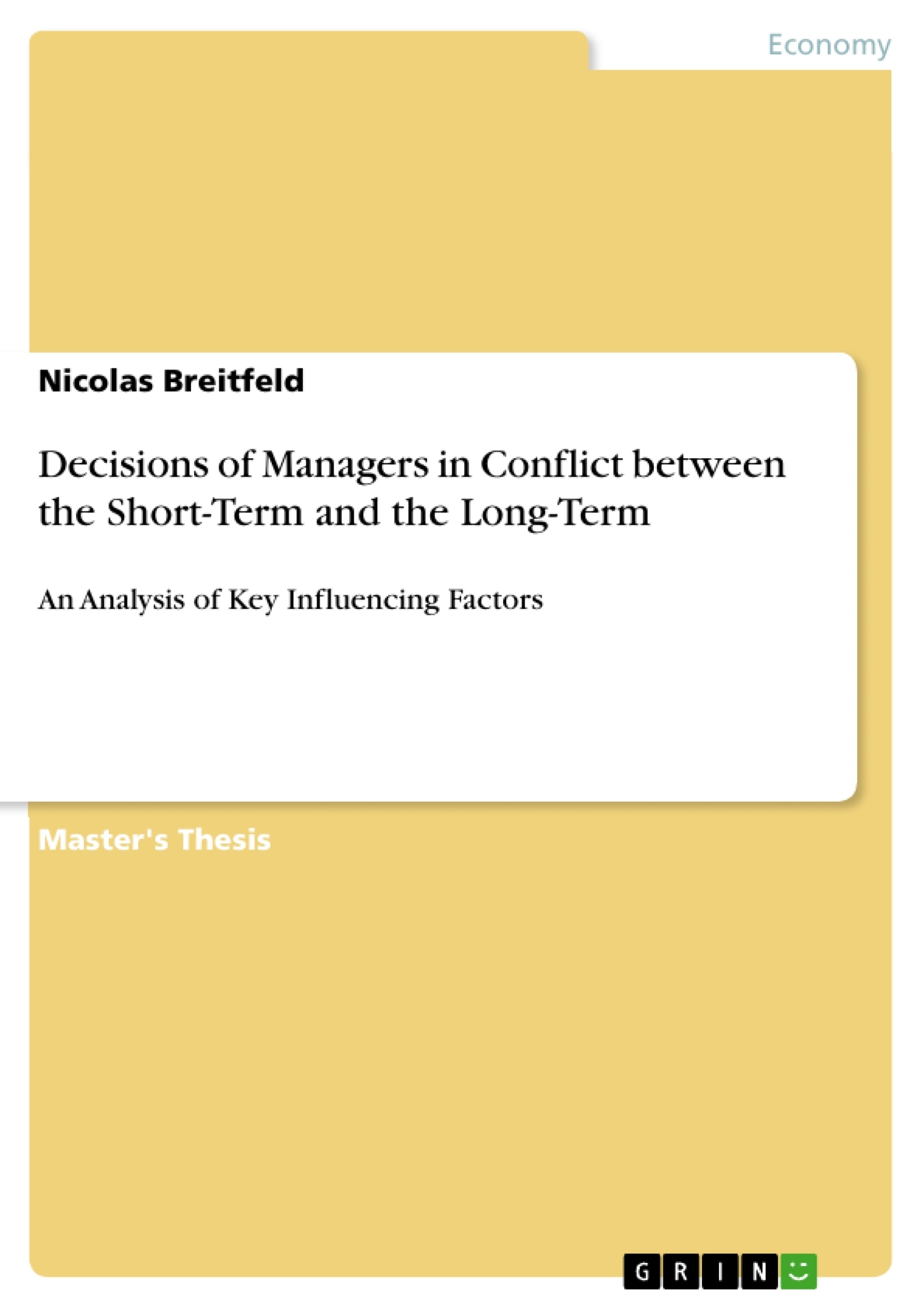This research is about decision-making by managers with a focus on decisions where a conflict between short-term and long-term is present (also known as the problem of intertemporal choice). The discussion in this area has been an ongoing one for many years. Many critics argue that managers focus too much on short-term because of increasing pressure from institutional investors which leads to suboptimal long-term development of their company. But there are other reasons which favour a short-term orientation. In the course of research on this topic, I found that it is not yet clear which factors are the most important ones for managers and their ultimate decisions. Therefore, the main goal of this research is to discover the most important influencing factors and to analyse their relevance.
This research is driven by an explorative approach and includes an extensive literature review combined with ten interviews with managers from different companies. The background is that a great deal of research has been done on this topic, but seldom with a broad approach such as this. Often research focuses on one factor, e.g. pressure from financial markets, bonuses, or others. One finding is that influencing factors stem from many areas and an interdisciplinary approach is necessary for further research. The findings of this research represent a good basis for that by exploring the most important factors that influence managers. It categorizes the influencing factors into indirect and direct factors, the latter representing the economic, organizational, and individual dimension. In addition, four findings are emphasized: too much pressure from financial markets result in the question whether quarterly earnings statements and predictions are still necessary; the importance of corporate strategy and its communication, the need for interdisciplinary research (e.g. combined with psychology), and the importance of developments in society and their interaction with management decisions.
Inhaltsverzeichnis (Table of Contents)
- Introduction
- Management decisions – influenced by intertemporal choice
- Research background
- Research aim
- Research question and objectives
- Overview
- Literature review
- Introduction
- Definitions
- The starting point
- Recent developments
- Current state of research
- Economic factors
- Organizational factors
- Individual factors
- Measures
- Research design and methodology
- Research strategy
- Design and methodology
- Sources of data
- Data analysis
- Ethics
- Applicability, reliability, replication and validity
Zielsetzung und Themenschwerpunkte (Objectives and Key Themes)
This research investigates decision-making by managers, particularly focusing on decisions where a conflict between short-term and long-term considerations exists. The primary goal is to identify and analyze the most important influencing factors affecting these decisions. The research utilizes an explorative approach, combining a comprehensive literature review with interviews conducted with managers from various companies.- Identifying and categorizing key influencing factors that impact managerial decisions in the context of short-term versus long-term considerations.
- Exploring the role of pressure from financial markets and its potential influence on managerial decision-making.
- Examining the significance of corporate strategy and communication in shaping managerial decisions.
- Highlighting the need for interdisciplinary research, particularly integrating psychology, to gain a deeper understanding of managerial decision-making processes.
- Analyzing the impact of societal developments and their interaction with managerial choices.
Zusammenfassung der Kapitel (Chapter Summaries)
- Introduction: This chapter introduces the research topic, focusing on the conflict between short-term and long-term considerations in managerial decision-making. It outlines the research background, aim, question, objectives, and provides an overview of the subsequent chapters.
- Literature Review: This chapter provides a comprehensive review of existing literature on the topic of intertemporal choice in managerial decision-making. It explores definitions, historical developments, and current research perspectives, including economic, organizational, and individual factors influencing such decisions. It also discusses various measures used in this field.
- Research Design and Methodology: This chapter outlines the research strategy employed, including the design, methodology, data sources, data analysis techniques, and ethical considerations. It also addresses issues related to the research's applicability, reliability, replication, and validity.
Schlüsselwörter (Keywords)
This research delves into managerial decision-making, specifically focusing on the intertemporal choice dilemma, where short-term gains conflict with long-term goals. Key concepts include influencing factors, corporate strategy, interdisciplinary research, societal developments, financial markets, quarterly earnings, and decision-making processes. The research employs an explorative approach, combining literature review with interviews conducted with managers from various companies.Frequently Asked Questions
What is the problem of intertemporal choice in management?
It refers to the conflict managers face when choosing between short-term gains (often driven by financial market pressure) and long-term sustainable development of their company.
Why do managers often focus too much on the short-term?
Key factors include pressure from institutional investors, the requirement for quarterly earnings statements, and individual incentives like bonuses linked to short-term performance.
What are the three dimensions of influencing factors identified in the research?
The research categorizes factors into Economic (market pressures), Organizational (corporate strategy and communication), and Individual (psychology and personal incentives) dimensions.
How does corporate strategy influence long-term decision-making?
A clear corporate strategy and effective internal communication are essential to align management decisions with long-term goals and resist external short-term pressures.
Why is interdisciplinary research necessary in this field?
Decision-making is not purely economic; it involves psychological aspects and is influenced by societal developments, requiring a broader approach to understand the complexity of managerial choices.
- Citation du texte
- Nicolas Breitfeld (Auteur), 2010, Decisions of Managers in Conflict between the Short-Term and the Long-Term, Munich, GRIN Verlag, https://www.grin.com/document/182404



